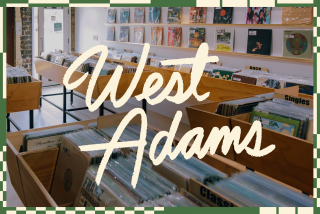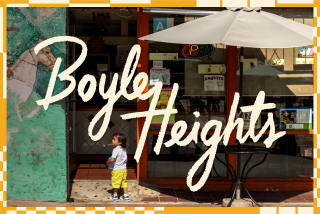Locals Saying Ciao to Boston’s Little Italy
BOSTON — The North End of this city was Paul Revere’s neighborhood, and ever since the patriot made his midnight ride locals have fled at the first sign of invaders.
Puritans packed up when the Irish arrived. The Irish shipped out when Jews and Portuguese moved in. Then the Italians sent them packing.
Now newcomers of another kind are settling in Boston’s oldest neighborhood, and signs of their presence are as plain as the Old North Church lanterns that sent Revere on his way.
The yuppies are coming! The yuppies are coming!
And the Italians are leaving, reluctantly surrendering one of the nation’s most vibrant Little Italys to a class of newcomers who think Starbucks invented cappuccino.
“The old-timers are gone,” laments Marie Polcari, whose immigrant father opened a coffee shop in the North End 67 years ago.
Back then, nearly all North Enders were Italian immigrants or their descendants. That started to change about mid-century, and by 1970 the census found that only about 60% could trace their ancestry back to the boot. A decade later the number had fallen to 53%. By 1990 it was below 38%.
The change is obvious on Sundays because St. Leonard Roman Catholic Church celebrates just one Mass in Italian.
It’s obvious on trash days too. A sociology student at Northeastern University measured the area’s gentrification one garbage bag at a time. The study, according to Professor Will Holton, indicated that young professionals had arrived when the researcher “found Saks Fifth Avenue and Bread & Circus bags rather than the nondescript ones with no special panache.”
The evolution is far from complete at a place like Polcari’s, with its ornate coffee bins and shelves of imported specialty foods. For every yuppie who strolls into the shop with a Crate & Barrel bag in hand, there’s a black-clad widow asking in Italian for a bottle of anise oil.
The neighborhood still teems with Italian restaurants, cafes and pastry shops. But many of those have gone upscale, infusing traditional peasant fare with ingredients that would seem as foreign as chop suey to a poor Sicilian immigrant.
“Who the hell ever put Grand Marnier in their sauce?” Polcari demanded with a laugh.
Even some of the recent arrivals worry that the place is getting too fancy for its own good. Carla Pasqualina, who moved to the North End five years ago from her native Australia, misses the polenta they used to dish out at a local lunch spot, now closed.
“They just kind of lumped it on a plate and you sat there and ate it,” said Pasqualina, 34.
Some say the neighborhood still has an authentic Italian flavor, even if newcomers and Freedom Trail tourists are the ones primarily lapping it up.
“People have squawked that they’re changing the North End,” said Fred Langone, 78, a former city councilman and unofficial mayor of the North End. “The faces change, but the whole atmosphere, the culture, is still here. There’s probably as much Italian spoken on Hanover Street as on Via Veneto in Rome.”
The neighborhood’s popularity has caused housing prices to rise even faster than those elsewhere in the booming Boston area. Bare-bones apartments have been converted into condos with every amenity but space: 500 square feet for more than $200,000. Tiny studio apartments fetch $1,000 or more a month in rent.
Soaring real estate prices have accelerated the exodus of old-timers. Some were pushed out. The lucky ones cashed out.
“People who said they would never move out, when the bag of money was put in front of them, it would have been stupid of them not to take it,” said Joe Matara, president of the Haymarket Pushcart Assn., which represents North End street vendors. “It’s an upward movement. There’s nothing wrong with it.”
High prices have pushed out some small shops in favor of higher-volume restaurants.
The neighborhood still has its share of butcher shops, where men in white aprons pull out hacksaws and whole sides of beef to cut meat to order. But gone are the tobacco stores where workers rolled cigars by hand. Tosi Music Co., which specialized in Italian recordings and sales of accordions, closed in December after more than 50 years.
A street musician who bought his accordion at Tosi’s plays a few blocks from the shuttered store. He pumps out the same song over and over--the theme to “The Godfather.” But John McCloud isn’t playing for the old North Enders, whose community newspaper regularly rails against mob stereotypes.
“A lot of tourists come in from the suburbs, and they say they want to hear that song,” he said. “They know they’re in the North End when they hear that.”
More to Read
Sign up for Essential California
The most important California stories and recommendations in your inbox every morning.
You may occasionally receive promotional content from the Los Angeles Times.










